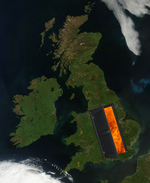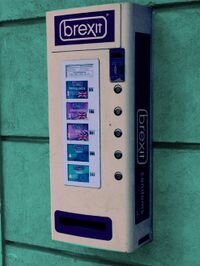Brexit
“If only I'd known about this at Yorktown!”
“Hi, I'm David Cameron, and this is Jackass”
Brexit is a type of emergency exit intended and reserved only for British people. It is distinguishable from other emergency exits by the placement of the words "please use this" in front of "emergency exit" on the green sign and the orderly queue that forms before it.
Origins
The Brexit was invented in 383 AD, when commander of Britannia, Magnus Maximus, chose to ignore the Roman Empire and set up his own little empire in Britain. This was a success until he got bored of being confined to the little island and returned to Rome in 388 AD. Upon approaching Rome, he encountered the Imperial Roman Army at the Battle of Save, in which the only thing that was saved was his severed genitalia, which were paraded around Rome by Emperor Theodosius the Great as a reminder to all about the terrifying possibilities of Brexit.
Copycat Brexits have occurred throughout recorded history:
- 410: Britain leaves the Roman Empire (successfully this time).
- 1272: After the end of Ninth Crusade, there was a Brexit from the politics of the Middle East (reversed the minute oil became a commodity).
- 1534: Brexit from Catholic Church when it was discovered King Henry VIII had hoes in too many postcodes.
- 1776: Thirteen bits Brexited on the trivial basis of being on the wrong side of the Atlantic Ocean, and spent the next decade testing the popular notion that the union was entirely voluntary. In 1861, following some controversy over adding new bits, eleven bits performed a follow-on Brexit of the other twenty to further test the same notion, but with a different outcome.
- 1938: Brexit from Europe's family Christmas dinner table, after Aunt Czechoslovakia steered the conversation towards Britain's agreement with Hitler.
- 1947: Forced Brexit from India (immediately preceded by Britain spitefully ripping the country into two pieces).
- 1997: Unforced Brexit from Hong Kong, one country with two systems, resulting in "One Country Two Systems" with disappearances and re-education camps.
- 2007: Brexit from AMC Theatre 8 during hour 3 of Titanic towards bathroom after having drunk 72 ounces of Sprite.
Reasons to perform a Brexit
Britons learn obsessive courtesy at a very early age and are all way too polite to nag their partners, or above all stop everything and instigate long, loud arguments to "clear the air." The national character is to "keep a stiff upper lip," forbear, and endure. British marriages often last an entire decade or more. Consequently, Britons' favourite way of resolving a completely untenable relationship is just to try to unobtrusively wander off. This is in stark contrast to Yanks, who believe that "When in the course of human events, it becomes necessary for one people to dissolve political bands," the best way is a loud Declaration proclaimed on every street corner, and it wouldn't hurt to burn down a few ammunition depôts.
A Brexit is thought to be good for the nation's economy, greatly increasing the value of the currency, having a positive effect on the stock market, and boosting the demand for tea. In addition, a Brexit is a sure-fire way for the Brexiting country (that would be Britain) to dealign itself from France and Germany, thereby freeing itself from the implied duty to wear lederhosen, sport handlebar moustaches, and be bossed around by a girl. It can then return to wearing kilts, sporting handlebar moustaches, and being bossed around by an Iron Lady.
Performing a Brexit
Performing a Brexit is no ordinary task. Before a Brexit manoeuvre can be performed, the user must prepare oneself. Firstly, the user is to be British. Many French, Germans and Italians have met their end attempting to perform a Brexit, the most notable being Mussolini, who performed a Brexit from the League of Nations (predecessor to modern bureaucracy) in 1937. Six years later, his corpse was hanging upside-down, suspended on meat hooks on the roof of a petrol station. Secondly, one needs to concentrate all their petty grievances about how things used to be better yet harder in the olden days, the youth, crime, immigrants, and the media blackout on the monthly rising cost of one's cup of tea with two sugars at Cafe Nero that one has every Saturday morning. This concentrated anger will lead to concentrated hatred, which will lead to concentrated suffering, which is what makes Robinson's freshly concentrated orange squash just taste so good. Thirdly, once the beverage has been consumed, one must consult random celebrities who have as little to do with your Brexit as they know about current affairs or as they care about anything but the popularity and money they get from giving their opinion. Preparation is then complete and the Brexit can be initiated.
On approaching the door to Brexit, one must adopt a semi-brace position. This is different from the usual brace position in that only the top-half of your body is involved. The hands move up to cover the ears, and the eyes are shut. The mouth opens and the voice box regurgitates a stream of numbers amounting to the cost (gross cost, not net cost — nobody ever said it was net cost) of not performing the Brexit, otherwise known as a Bremain.
Bremain could be the single most terrifying experience that would ever fall upon the citizens of the UK. Without even beginning to mention the meteorite impacts, the trees and buildings being hurled upwards as the Earth's tectonic activity erupts, and the hordes of Jihadis sent over from Brussels, all called John and all working in chocolate shops selling Brighton rock with the words "Allah — Peace be upon him" written through the middle to innocent children, Bremain would be a disaster on a magnitude of the Richter scale that would give a geologist an orgasm.
The 1975 Brexit
The 1975 Brexit was not successful. Fortunately, lack of success is what government was hoping for, and that meant it was successful.
The Conservative Party had put Britain in the EC in 1973. Except —
- It was called the European Economic Community (EEC, pronounced "Eek!").
- It had only 7 nations in it, no jihadis, no seats for Turkey and Estonia, and South Sudan and Paraguay had not yet joined as "demonstration sports."
- The EEC was only doing small stuff like lowering tariffs, and had not moved on to dictate the size of greeting cards and such.
Nevertheless, the British electorate expressed its undying gratitude to the Tories — by chucking them out of office the next year. Labour promised it would renegotiate terms with the Eek! or else get Britain the Hell out.
Labour did negotiate tirelessly — stopping only to conduct yet another general election so as to get actual control of Parliament — and the Eek! conceded that Britain would forever have the right to drive on the wrong side of the road, print its own money, have exactly four television channels, and have a myriad of political parties that stand for nothing, especially what their names would suggest. Britons would forever be free to go dahn th' paab and order either bitters or lager, nice and warm and flat. (Warm and flat lager is not refreshing, but Britons have taken it this way ever since, out of concern that this "opt-out" might otherwise lapse.) And there would always be a bird with big tits on Page Three.
So Labour put Brexit on the ballot as promised — and recommended that Britain vote it down. The notion that Labour had done things so well that it be excused from doing what it promised to do inspired 67% of voters, and nearly half of the Cabinet. But the national desire to get free of the snail-eating French and the goose-stepping Germans was not swallowed whole, just moved to the back burner and dialled down to Simmer.
The 2016 Brexit
The Lisbon treaty, while generally tightening the European handcuffs, installed a handy Quick Release Button on each one, adding Article 50 (the “Eject Manifesto”) that says that any signatory could just walk away. In 2016, a groundswell emerged for a Brexit referendum, based on several national trends:
- Premiership football teams had become so full of uber-talented European players that it was impossible to pick an effective England squad.
- Immigration had become so entrenched that a Polish Sklep opened in Stradbroke.
- Most of the population had bargain-bucket mortgages with Santander (as recommended by Martin Lewis).
- Cafés began to put parsley on egg and chips.
Commentators thus came to believe that maintaining financial stability, trade stability, and multi-country employment via an unelected, undemocratic group of empire builders — who also happen to be the biggest, most established, profitable dependent of the London's banking industry — seemed like a slightly worse option than severing all ties, then jumping off a cliff blindfolded.
The formal ballot
The 2016 Brexit was achieved by a ballot that asked Britons exactly what they wanted to do. For simplicity and clarity, there were only two options.
Remain meant that Britain would stay in the European Union. Britons who were dissatisfied with the European Union were to vote Remain. Prime Minister David Cameron stressed that such a majority would give him new leverage over the Eurocrats to negotiate for more "opt-outs" and special privileges for the United Kingdom. The mere presence of a secession referendum would give Cameron so much "street cred" on the streets of Brussels as to render itself completely unnecessary.
Leave meant that Britain would leave the European Union. Those satisfied with the European Union were to vote Leave. Likewise those simply terrified of the alternative, or simply in possession of a ten-year contract to provide consultancy services to the European Union, or in Britain illegally after swimming across from Arabia and invoking their right to travel within the Union to reach Britain and demand free fish and chips.
This would put into place an interminable period of transition measures, delayed implementation votes, and television programmes that would explain why it would be wise to protect the public from its stated will. In other words, voting Leave would lead to business-as-usual.
Celebrity opinions
For advice regarding the Brexit referendum, ordinary Britons looked for the world's best experts — in sorcery, fiction, and the prospects for extraterrestrial life:
- Michael Caine, known for his very popular appearances in the film industry with extremely important roles such as being Batman's butler, told Britons they should no longer do what tons of faceless civil servants say and should instead follow a hero behind a mask.
- J.K. Rowling, on the other hand, expressed concern about the post-Brexit future of Hogwarts, as it has no such exit (certainly not Platform Nine and Three-Quarters).
- B.H. Obama made a cameo appearance from the United States and stated that leaving the European Union would render Britain too piddling of a nation for the U.S. to care about in future trade negotiations. Obama said a Leave vote would put Britain at the back of the proverbial bus, believing that Britain would be bowled over by references to Negro slavery as his Yankee adversaries are.
- Stephen Hawking stated that Brexit could actually be a small scale of a black hole, and that there might be no way back after taking it.
Polling
All credible opinion polls showed a large majority eager to vote to remain in the EU. Their credibility had been established on multiple occasions beyond the margin of error —
- That the Conservative Party "would hang onto power by the skin of their teeth" in 2015;
- That the sexting fad "would never catch on here"; and
- That most Britons believe the Queen Mum will live to see 160 years of age and will still be witty and radiant.
Immediate aftermath
In the immediate aftermath of the Brexit vote, all parties called for calm and level-headedness, in contrast to the panic and Armageddon each had predicted in the immediate run-up to the Brexit vote. All those at the top vowed to show leadership by example. Delaying the invocation of Article 50 to keep international markets in turmoil for at least three months, projected resignations, and immediate resignations of the entire shadow cabinet, would all serve to steady the ship.
The EU also aimed for stability, as their financial position had become even more precarious. Thus, they announced their intention to make the divorce as acrimonious as possible, and to conduct future commerce with the UK strictly at “tourist prices,” if at all. Calm also prevailed in international markets, after a brief and lucrative panic in common shares. The pound sterling lost most of its value, but this was balanced by most other hard assets losing most of their value as well. This meant that relative prices survived Brexit with no change, other than everyone's savings had been cut in half again.
There was one major change. Prime Minister David Cameron had originally argued that British voters should be given the option of secession, which they would vote against, allowing Cameron to use his own ballot loss to wrest new concessions from Brussels as consolation. Cameron's model was U.S. President Obama, who had repeatedly parlayed inability to push a bill through Congress into apparent new power to just do it himself. When Cameron's proposal unexpectedly won, Cameron concluded that he was “not the right person” to put it into effect, and that if voters were bold enough to blow up European union, he should at least torch the Conservative Party.
In Brussels, the EU was predictably hurt by the rejection by what Commission President Jean-Claude Juncker called "little England," but he insisted the “British remain our friends”. Meanwhile, British MEP Nigel Farage was giddy that, in little more than a decade, his signature issue finally won a vote somewhere, even though at a time when his own Prime Minister was certain the issue had been overtaken by events. “No one is laughing at me now!” said Farage, though he was wrong about that as well.
The 52-48 majority for Brexit was immediately called indecisive. Perhaps Britain's famously unwritten Constitution demands a two-thirds vote. Who knows? no one can read it. However, within days, two million Britons signed an Internet petition claiming they had voted Leave but, having gotten their way, no longer wanted it but wished to switch to Remain. Oddly, there was no comparable petition of losers who wanted to join the winning side and declare "acclamation" as a show of unanimity. The Brexit vote being by secret ballot, there was no way to know the signers actually voted Leave; however, most of the Internet addresses were from Britain. Those that were not were surely Britons on holiday. Unfortunately, while one sometimes does not get what one votes for in the voting booth, one almost never gets what one wants signing anonymous Internet petitions.
Follow-on initiatives
The spectre of a large country getting out of something it wasn't supposed to be able to get out of emboldened every other community that felt trapped inside a Greater Community.
- Scotland had for decades sought to get out of Great Britain. It was now faced with a quandary: Fish A having been swallowed in a single gulp by Fish B, is it easier or harder to get out if Fish B is subsequently swallowed whole by Fish EC? Scottish leaders resolved to take a position on Brexit on an ad hoc basis, after seeing whether British or European leaders looked sillier. Unfortunately, at the time of the Brexit vote, both sets of politicians were out-loathsome by the leadership of the Scottish National Party.
- Ireland's Enda Kenny announced a plan for Ireland to enter the United Kingdom — a move he called Brentry, in order to avoid having his country leave the European Union, which would mean that he would have to actually govern it. He envisaged that the new nation would be called the European Union of Great Britain, and that it could have a common currency, which he proposed to call the euro.
- America, the land of No-Fault Divorce and getting a summer puppy, was enthused at the Brexit vote. Despite the Eagles' scary song about a fantasy hotel where "You can check out anytime you like, but you can never leave," Americans believe that you can walk away from anything, and the biggest risk is finding that your ex scratched your CDs. The American union, after all, is voluntary, and when a bunch of states decide to stop shacking up — say, to pursue their own vision of property rights — they are free to go without some sort of Civil War breaking out over it.
- Texas was famously admitted to the Reunited States under a unique treaty in which it reserved the right to split into six states — a thoroughly pointless move, except for immediately acquiring 12 votes in the U.S. Senate compared to 2 for every other state, and if anyone called that unfair, you could just show them the wording. Nevertheless, the so-called Texit movement was hampered by the youthful electorate that believed that their current contract already gave them 100 free Texits per month.
- Likewise, the continual partition movement in California began to regain steam, though it was eclipsed by a referendum drive to mandate paid bereavement leave when you abandon the puppy in the woods at the end of the summer.
- In the U.S. Presidential campaign, Donald Trump took cues from the Brexit vote, which he praised as Britons "taking back their sad little country that no one ever goes to." He vowed to do the same, although knowing little about his own country beyond paying it more bribes than Hillary Clinton accepted — and most of these to Hillary. Nevertheless, the entire Trump campaign had been less about ideas — as the few he had espoused mostly had to be "walked back" by an aide the next day — than about the glee of forcing the central government to eat a large crap sandwich, as Brexit had been — a double-decker.
Leave also
| Featured version: 9 July 2016 | |
| This article has been featured on the main page. — You can vote for or nominate your favourite articles at Uncyclopedia:VFH. | |






